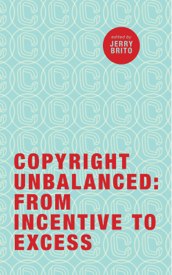As you likely know by now, the Republican Study Committee published a briefing paper critical of copyright, but then later pulled it down claiming the memo had not received adequate review. Some have suggested that IP-industry pressure may have led to the reversal. I hope we will find out in due time whether the paper was indeed reviewed and approved (as I suspect it was), and why it was removed. That said, I think what this take-down likely shows is a generational gap between the old, captured, and pro-business parts of the Republican Party and its pro-market and pro-dynamism future.
I also hope that this dust-up sparks a debate within the “right” about our bloated copyright system, and so it’s propitious that in a couple of weeks the Mercatus Center will be publishing a new book I’ve edited making the case that libertarians and conservatives should be skeptical of our current copyright system. It’s called Copyright Unbalanced: From Incentive to Excess, and it is not a moral case for or against copyright; it is a pragmatic look at the excesses of the present copyright regime and of proposals to further expand it. The book features:
- Yours truly making the Hayekian and public choice case for reform
- Reihan Salam and Patrick Ruffini arguing that the GOP should take up the cause of reforming what is now a crony capitalist system
- David Post explaining why SOPA was so dangerous
- Tim Lee on the criminalization of copyright and the a use of asset forfeiture in enforcing copyright
- Christina Mulligan explaining that the DMCA harms competition and free expression
- Eli Dourado calculating that the system we have today likely far exceeds what we need in order to offer authors an incentive to create
- Tom Bell suggesting five reforms for copyright, including returning to the Founders’ vision of what copyright should be
Conservatives and libertarians, who are naturally suspicious of big government, should be skeptical of an ever-expanding copyright system. They should be skeptical of the recent trend toward criminal prosecution of even minor copyright infringements, of the growing use of civil asset forfeiture in copyright enforcement, and of attempts to regulate the Internet and electronics in the name of piracy eradication. I think our movement is very close to seeing that copyright reform is not just completely compatible with a respect for property rights, but a limited-government project. We hope our book will help make the case.
Also, the Cato Institute will be hosting a lunchtime book forum on December 6. Tom Bell and I will present our views and Mitch Glazier of the Recording Industry Association of America will respond. Please RSVP to attend and tell your colleagues.


 The Technology Liberation Front is the tech policy blog dedicated to keeping politicians' hands off the 'net and everything else related to technology.
The Technology Liberation Front is the tech policy blog dedicated to keeping politicians' hands off the 'net and everything else related to technology.